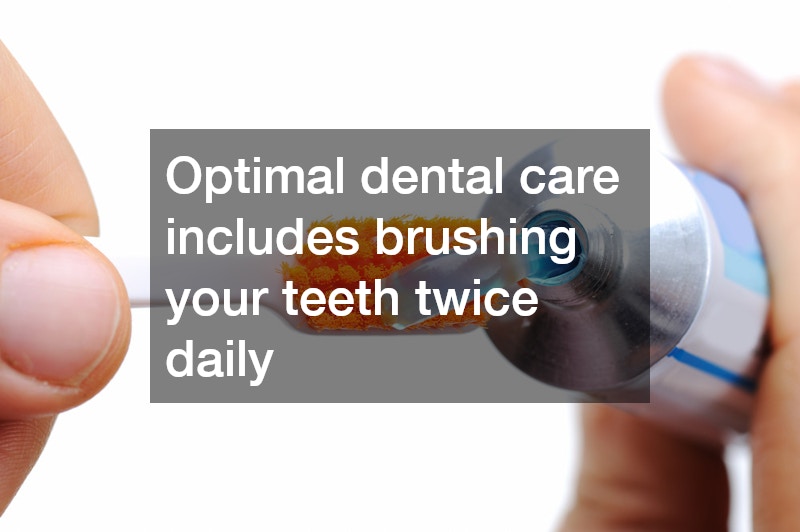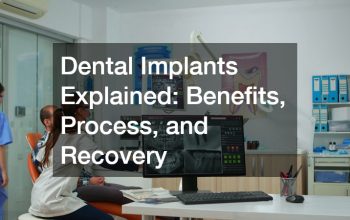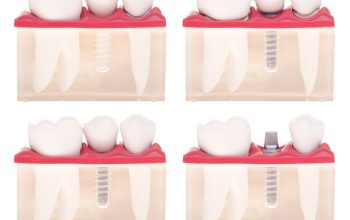
One essential element in caring for your health is caring for your dental health. Poor dental health can cause infections, which can spread to your gums and damage your ability to chew. Dental health isn’t restricted to your teeth. It can affect your overall health. In addition, serious dental problems could spread through your body, via your bloodstream, and cause serious infections. Your oral and dental health begins with good routine dental care.

According to the Mayo Clinic, optimal dental care includes brushing your teeth twice daily and flossing once a day. Use a fluoride toothpaste, because beneath a set of healthy looking teeth can sometimes hide some unseen cavities. According to Healthline, the ads you hear about the benefits of fluoride are true: the regular use of fluoride does help reduce the risk of tooth decay.

Despite brushing and flossing your teeth, your palette and inner mouth surfaces are potential sites for infection. Therefore, use a mouthwash with fluoride – or a mouthwash recommended by your dentist, to keep your mouth cleaner than plain toothpaste. People with severely crooked teeth may be referred by their dentist to an orthodontist. Orthodontists will examine you to determine if braces can correct dental misalignment problems.
In the United States and around the world, individuals do certain things to remain healthy. They visit doctors for checkups as well as medicine if they are ill. They try to exercise at least thirty minutes a day to maintain their physical health. Lastly, they visit a dentist for teeth cleanings every six months. In terms of the dentist, sometimes you’ll have to have other procedures done aside from a teeth cleaning. These procedures keep your teeth healthy, however. If you have to go to the dentist soon, here is what you need to know about a wisdom tooth procedure and other procedures.
Oral Surgery Procedures: Wisdom Tooth Extraction
To begin, wisdom tooth removal is one of the most common oral surgery procedures you can get in a dentist’s office. In fact, this procedure is so common that 5 million Americans get their wisdom teeth removed every single year. A wisdom tooth, by definition, is a third molar in the back of your mouth. Unlike many of the other teeth we have in our mouths, wisdom teeth begin to erupt through the gum when you’re in your early teens to around your early twenties. Additionally, these teeth aren’t baby teeth that fall out so that an adult tooth can arise and take its place. Wisdom teeth are simply gums, until they break through. Yes, nothing is there, at first! This third molar actually comes in a set of four. You have two wisdom teeth on the bottom, and two wisdom teeth on the top. However, sometimes these molars cause problems when they erupt through the gum.
For many people, there is not enough space for wisdom teeth in their mouths. This occurrence is termed impacted wisdom teeth. This is when wisdom teeth do not have enough room to emerge and they also do not have enough room to develop as other teeth did. Additionally, this can cause tooth decay, infection, gum disease, trapped food particles, damage to other molars, and extreme pain. Therefore, they’ll need a wisdom tooth procedure.
This wisdom tooth procedure, or wisdom tooth removal, is an outpatient procedure. You are put to sleep through anesthesia. There are three types of anesthesia that you can choose from. Needless to say, you won’t feel a thing while the dentist or oral surgeon removes the problematic teeth. He or she will make a careful incision along your gum line so your wisdom teeth and gum are exposed. They will then remove any bone and then the wisdom teeth. Some dentists or oral surgeons will remove the wisdom tooth in some pieces as that is easier.
After this wisdom tooth procedure you will experience bleeding and pain. This action of bleeding is extremely common only on the first day after the wisdom tooth removal. Your dentist or oral surgeon will recommend that you place gauze on the area and replace this gauze once it is pretty saturated with blood. For the pain you can easily take over-the-counter pain medications. However, your dentist or oral surgeon can prescribe pain medication if need be.
After your wisdom tooth procedure, your jaw and cheeks will both be swollen and possibly bruised. Ice packs will help with this. Because of the extreme swelling, you will not be able to consume food like you previously did. Anything soft such as yogurt, ice cream, jello, and apple sauce will be ideal to eat for the first day or two, at least.
All in all, you’ll definitely feel much better once your wisdom teeth and removed and you’re healed.
Teeth Implants
Dental implants are actually pretty common for many Americans throughout the United States. They also serve different purposes. For example, if you lost your baby tooth, and an adult tooth never grew in, you will benefit from a dental implant. Additionally, if your tooth has been injured, infected, or has begun to decay, you will benefit from an implant.
It is important to note that while adults typically receive dental implants, children can as well. This is for children aged sixteen to eighteen. More specifically, aged sixteen for females and aged eighteen for males.



